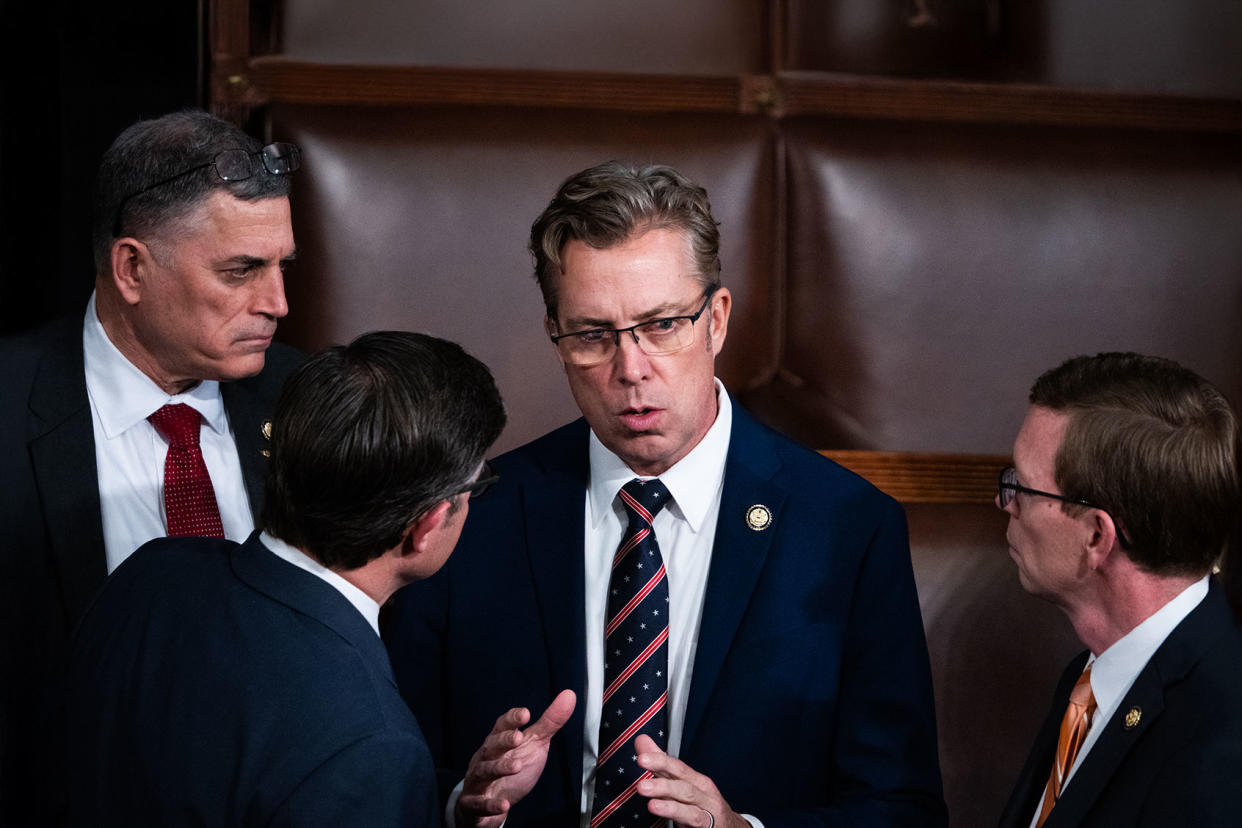
Andy Ogles : Andy Ogles, a prominent Republican representative from Tennessee, recently made headlines for proposing a controversial constitutional amendment. This amendment, which would allow the state to reject federal laws and regulations, has sparked widespread debate across political and public circles. In this article, we will delve into who Andy Ogles is, the implications of his proposal, and its potential impact on Tennessee and the United States as a whole.
Table of Contents
Who is Andy Ogles?
Andy Ogles is a Republican member of Congress representing Tennessee’s 5th Congressional District. Known for his staunch conservative views, Ogles has built a reputation as a vocal advocate for state sovereignty and limited federal government. Before his political career, Ogles served as the president of a free-market think tank and gained experience in economic policy and grassroots activism.
Ogles’ political journey reflects his commitment to promoting policies that align with traditional conservative values. His recent proposal to amend Tennessee’s constitution highlights his belief in empowering states to challenge federal authority.
The Proposed Amendment: What Does It Entail?
Andy Ogles’ amendment seeks to grant Tennessee the power to nullify federal laws and regulations that the state deems unconstitutional. This proposal, rooted in the concept of state sovereignty, argues that states should have the authority to push back against federal overreach. If passed, the amendment would mark a significant shift in the balance of power between state and federal governments.
The key provisions of the amendment include:
- State Authority Over Federal Laws: Tennessee lawmakers would be able to review and reject federal mandates that they believe infringe upon the rights of the state or its citizens.
- Judicial Review Process: The amendment outlines a mechanism for state courts to evaluate the constitutionality of federal regulations.
- Empowerment of Local Governance: By reducing dependency on federal oversight, the amendment aims to strengthen local governance and decision-making.
Implications of the Proposal
Support for the Amendment
Proponents of the amendment argue that it is a necessary step to protect states’ rights. They believe:
- Combating Federal Overreach: The federal government often imposes regulations that may not align with the needs and priorities of individual states. This amendment would allow Tennessee to push back against such mandates.
- Empowering Citizens: By decentralizing power, the proposal aims to give Tennesseans more control over laws affecting their lives.
- Preserving Constitutional Principles: Advocates assert that the amendment aligns with the Tenth Amendment of the U.S. Constitution, which reserves powers not delegated to the federal government for the states.
Criticism and Concerns
Critics of the proposal raise several concerns, including:
- Constitutional Challenges: Opponents argue that the amendment could face significant legal hurdles, as federal law is deemed the supreme law of the land under the Supremacy Clause of the U.S. Constitution.
- Potential for Conflict: Granting states the power to nullify federal laws could create conflicts between state and federal authorities, leading to legal and political instability.
- Impact on Federal Programs: The amendment could affect federally funded programs in areas such as healthcare, education, and infrastructure, potentially disrupting services for Tennessee residents.
Historical Context: Nullification and States’ Rights
The concept of nullification has deep historical roots in the United States. It dates back to the early 19th century, when states like South Carolina attempted to nullify federal tariffs. While the idea has resurfaced periodically, it has often been met with legal challenges and controversy.
Andy Ogles’ proposal echoes this historical debate, highlighting the ongoing tension between state and federal powers. Understanding this context is essential for evaluating the potential consequences of the amendment.
Public and Political Reactions
The proposed amendment has elicited mixed reactions from the public and political leaders. Some conservative groups and legislators have expressed support, viewing it as a bold step to safeguard state sovereignty. On the other hand, civil rights organizations and progressive leaders have criticized the proposal, warning that it could undermine federal protections and lead to discriminatory practices.
Public opinion on the amendment remains divided. Polls indicate that while some Tennesseans support greater state autonomy, others are concerned about the practical implications of the proposal.
What’s Next for Tennessee?
The amendment process in Tennessee requires approval by both the state legislature and voters. This multi-step process ensures that the proposal undergoes thorough scrutiny before becoming law. Key milestones include:
- Legislative Debate: Tennessee lawmakers will discuss and vote on the amendment. Public hearings and expert testimonies may play a crucial role in shaping the outcome.
- Voter Referendum: If approved by the legislature, the amendment will be placed on the ballot for a statewide vote.
The outcome of this process will have significant implications for Tennessee’s future and could set a precedent for other states considering similar measures.
External Perspectives
To gain a broader understanding of the implications of Andy Ogles’ proposal, it is helpful to consider expert analyses and commentary:
- Brookings Institution: A leading think tank, Brookings provides insights into federalism and the balance of power between state and federal governments.
- Heritage Foundation: This conservative organization offers perspectives on states’ rights and constitutional principles.
- National Constitution Center: A valuable resource for exploring the legal and historical context of nullification and federalism.
Internal Linking
For more articles on U.S. politics and state governance, visit our website at The Newsify. Stay informed about the latest developments in Tennessee and beyond.
Andy Ogles’ proposed amendment represents a pivotal moment in the ongoing debate over states’ rights and federal authority. While the proposal has sparked intense debate, it underscores the importance of balancing power in a way that respects both state sovereignty and the principles of federalism. As Tennessee navigates this complex issue, the eyes of the nation remain fixed on the outcome.
To learn more about political developments and their implications, explore our in-depth articles at The Newsify.
The Proposal to Amend the Constitution: A Third Term for Trump?
The idea of allowing a U.S. president to serve more than two terms has ignited debates throughout the nation’s history. Recently, Representative Andy Ogles (R-Tenn.) introduced an amendment to the U.S. Constitution aimed at making such a scenario possible—specifically for former President Donald Trump. The proposal, which allows for the possibility of a third term in office, has raised significant questions about its implications for American democracy, leadership, and the constitutional framework that has governed the nation since its inception.
The Current Constitutional Framework
The 22nd Amendment to the U.S. Constitution, ratified in 1951, restricts any individual from being elected to the presidency more than twice. This amendment was a direct response to President Franklin D. Roosevelt’s unprecedented four terms in office, which many viewed as a potential consolidation of power contrary to democratic principles.
The language of the 22nd Amendment is clear: “No person shall be elected to the office of the President more than twice, and no person who has held the office of President, or acted as President, for more than two years of a term to which some other person was elected President shall be elected to the office of the President more than once.”
Ogles’ proposed amendment seeks to modify these restrictions. It states: “No person shall be elected to the office of the President more than three times, nor be elected to any additional term after being elected to two consecutive terms, and no person who has held the office of President, or acted as President, for more than two years of a term to which some other person was elected President shall be elected to the office of the President more than twice.”
While the amendment would still impose limits on presidential terms, it represents a significant departure from the established norm.
Ogles’ Justification for the Amendment
In a statement, Rep. Ogles emphasized that the amendment is driven by what he perceives as the nation’s urgent need for strong leadership. “President Trump’s decisive leadership stands in stark contrast to the chaos, suffering, and economic decline Americans have endured over the past four years,” Ogles said. He argued that Trump’s policies and leadership style have positioned him as the only modern leader capable of reversing the nation’s trajectory of decline and restoring its greatness.
This rhetoric reflects a broader sentiment among Trump’s supporters, who see his presidency as a period of significant achievements. From economic growth to judicial appointments, they argue that his administration delivered tangible results that should not be cut short due to constitutional restrictions.
The Context of the Proposal
The proposal comes at a time when Trump remains a highly polarizing figure in American politics. His influence within the Republican Party is undeniable, with many GOP lawmakers and voters continuing to support his vision for the country. However, the idea of altering the Constitution to enable a third term has sparked criticism from both sides of the aisle.
Trump himself has occasionally joked about the possibility of a third term. During a meeting with House GOP lawmakers, he quipped, “I suspect I won’t be running again, unless you do something… unless you say, ‘He’s so good, we have to just figure it out.’” While Trump’s remarks were widely interpreted as a joke, they have nonetheless fueled discussions about the feasibility and desirability of such a change.
Reactions to the Proposal
The response to Ogles’ proposal has been mixed. Supporters argue that extraordinary times call for extraordinary measures. They contend that Trump’s leadership is uniquely suited to address the challenges facing the nation, from economic uncertainty to geopolitical threats.
Critics, however, see the proposal as a dangerous precedent that could erode the democratic principles enshrined in the Constitution. “This isn’t about one individual,” said one constitutional scholar. “It’s about maintaining the balance of power and ensuring that no single person can dominate the political landscape indefinitely.”
Moreover, some House Republicans have sought to downplay the seriousness of the proposal. Rep. Tim Burchett (R-Tenn.) dismissed Trump’s comments about a third term as a joke, emphasizing that they should not be taken literally. “That was a joke. It was clearly a joke,” Burchett said. “I leaned over to somebody beside me and said, that’ll be the headlines tomorrow: ‘Trump trying to thwart the Constitution.’”
The Process of Amending the Constitution

Amending the U.S. Constitution is a complex and arduous process. It requires either a two-thirds majority vote in both the House and Senate or a constitutional convention called by two-thirds of state legislatures. Following this, the amendment must be ratified by three-fourths of the states.
Given these stringent requirements, the likelihood of Ogles’ amendment gaining traction is slim. The process is designed to ensure that only amendments with broad, bipartisan support can become law. In the current political climate, achieving such consensus on an issue as contentious as presidential term limits seems highly improbable.
Historical Precedents
The United States has rarely amended its Constitution to address specific political figures or moments. The 22nd Amendment itself was an exception, crafted in response to Roosevelt’s extended presidency. Historically, amendments have focused on broad principles, such as voting rights, civil liberties, and the balance of power.
Allowing a third term for a specific individual—even one as influential as Trump—could set a precedent that many believe undermines the Constitution’s role as a safeguard against the concentration of power.
Broader Implications
The debate over Ogles’ proposal raises fundamental questions about the nature of leadership and democracy in the United States. Proponents argue that the nation’s challenges demand strong, decisive leadership that transcends traditional term limits. Opponents counter that the framers of the Constitution intentionally limited presidential power to prevent the rise of authoritarianism.
The proposal also highlights the enduring polarization in American politics. For Trump’s supporters, the idea of a third term represents an opportunity to solidify his legacy and continue his agenda. For his detractors, it is a troubling sign of an erosion of democratic norms.
Conclusion
Rep. Andy Ogles’ proposal to amend the Constitution and allow for a third presidential term is unlikely to succeed, given the significant hurdles it faces. However, it serves as a reminder of the deep divisions and passionate debates that define American politics today. Whether viewed as a necessary step to ensure effective leadership or a dangerous erosion of constitutional safeguards, the proposal has undeniably sparked a national conversation about the future of democracy in the United States.









Leave a Reply